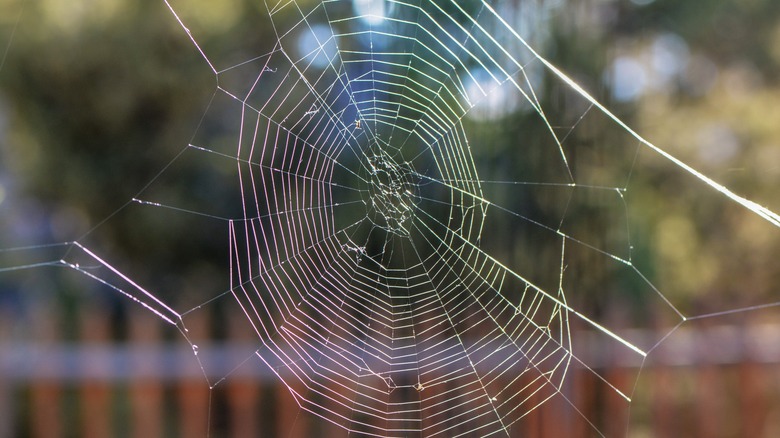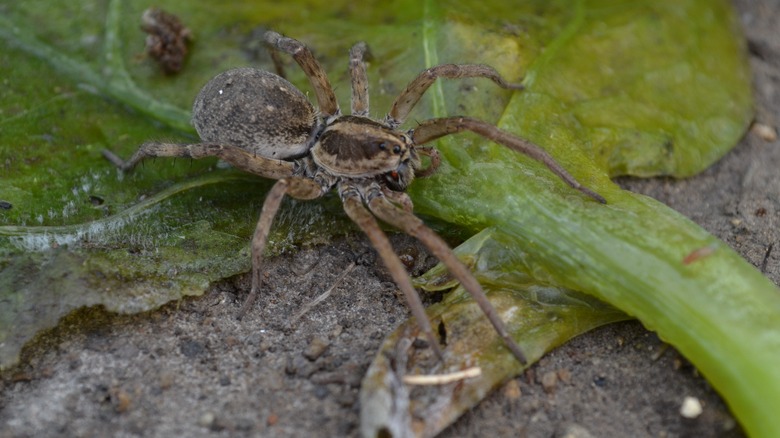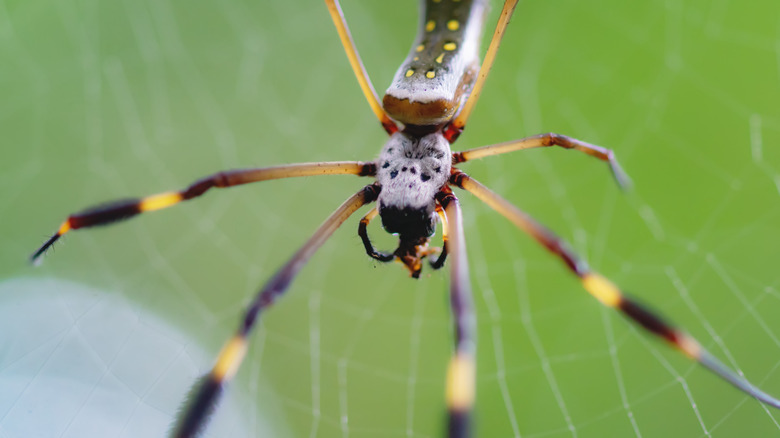The Biggest Spiders In The USA Might Be Lurking In Your Backyard
If you have insects in your backyard, chances are that spiders may live there, too. Bugs mean there's a food source for spiders, as they are carnivores. But despite their fearful appearance, they are some of the best arthropods to have patrolling your property as natural pest control. Your backyard provides an ideal habitat for many spider species, especially if you have decaying logs, abandoned shelters, grass, and rocks. Big spiders may be large in size due to the temperature of their environment and diet. Some of the largest ones likely making a home in your backyard in the U.S. include the Carolina wolf spider (Hogna carolinensis), huntsman spider (Heteropoda venatoria), and the golden orb weaver (Trichonephila clavipes). Many of them are over 2 inches in size, including their legs.
Don't freak out, though. They aren't invading your backyard. Instead, they're picking off bugs that you'd rather not deal with anyways, like wasps and cockroaches. Some common household staples can keep them away and kill them if they get too close. However, you could be making some mistakes that are attracting spiders to your house and yard like keeping your firewood pile in the vicinity. Overgrown shrubs and leaving brush piles around also attracts spiders. If you can keep your insect populations to a minimum, this will reduce their food source and send them looking outside your backyard.
Backyard spiders to look for
The Carolina wolf spider is the largest of the 240 wolf spiders in North America, getting up to 4 inches big including their legs. They burrow underground and rely on their superb eyesight and speed to run down their prey. Keep in mind that most spiders are active during the spring when bugs come out in full force. Web-building spiders like the cross orb weaver or the golden silk orb weaver will usually take up residence near gardens, wooden structures, and backyards. They spin eye-level orb webs to apprehend flying insects. Including their leg span, these orb weavers can grow anywhere between 1 ½ and 6 inches big. The 3- to 5-inch huntsman spider prefers areas like Texas, California, and Florida where it's warm. Unfortunately, they're often mistaken for brown recluses because of their brown and large appearances. But these misunderstood spiders only attack if their babies are in danger. Plus, they capture and devour cockroaches.
There are some large venomous spiders in your backyard you should look out for. Take proper precautions, like wearing gloves, when disturbing their habitat. The brown recluse spider (Loxosceles reclusa) often lives in wood piles, under rocks, and under logs, and can grow to around the size of a quarter, including leg span. Black widows (Latrodectus) are another known venomous spider in the U.S. with their recognizable ½-inch black body with a red hourglass. Even if you find venomous spiders, remember that they're there for the bugs — not you.
Big spiders are good for your backyard
Big spiders are a good sign your backyard is a thriving ecosystem. Not only are they a food source for birds, centipedes, and parasitic wasps, but they are a primary predator for bugs that wreak havoc on your gardens and plants. They eat flying and ground-dwelling insects alike. Most of them aren't known for attacking or being aggressive towards humans. Because of their size, they might have a more painful bite; yet, it will still be less painful than a bee sting. But unless they are provoked, touched, or their eggs are vulnerable, they will almost always shy away from you.
If you find a big spider near your home or in your backyard where you don't want them, you can always use a container or jar to catch and relocate them somewhere else. This is the most humane way to keep spiders away from your home and backyard. Pesticides alone won't get rid of spiders. But a combination of pesticides and removing rocks, wood piles, old boards, and abandoned shelters from your property should help reduce the number of both big and venomous spiders. Use a powerful jet stream of water to wash away their webs from undesired locations in your backyard.


